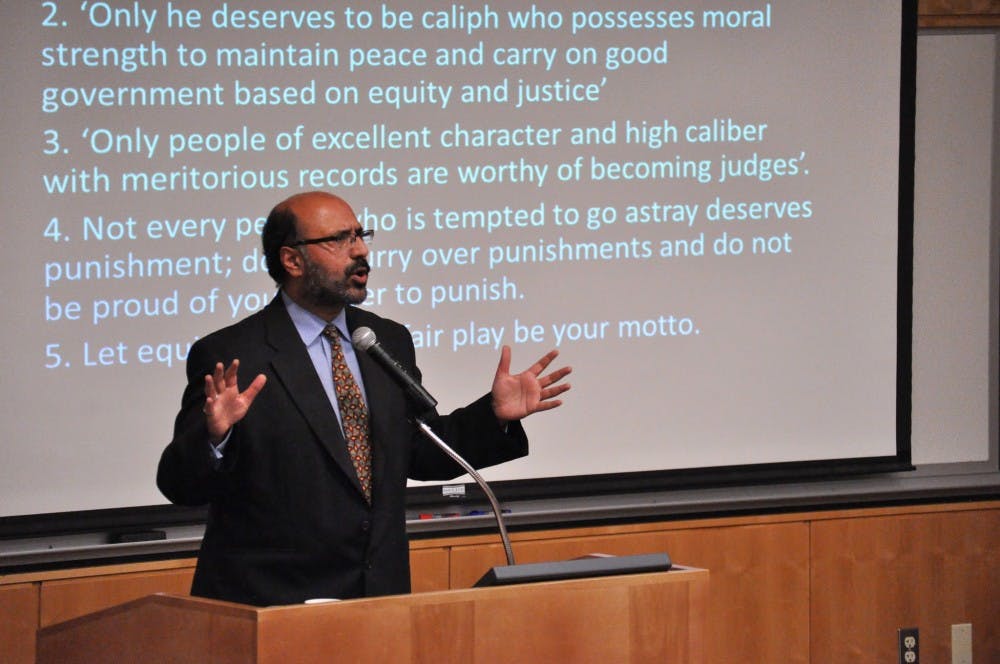Alina Rosenkranz |
Visiting author and professor Hassan Abbas inspired UP students with his insights on justice from the Islamic perspective at the annual William J. Mazzocco memorial lecture on Monday.
In his lecture “The Idea of Justice in Islam,” Abbas talked about justice being a universal value, which extremists, such as ISIS and the Taliban, exploit in order to achieve their political goals. Justice to him personally transcends any ideology and religion.
Abbas who has been a police chief in Pakistan, teaches at the National Defense University’s College of International Security Affairs in Washington, DC. He is also the chair of the department of Regional and Analytical Studies and senior advisor at the Asia Society. In August, he was guest on "The Daily Show" to talk about his latest book “The Taliban Revival”.
Justice is a central idea worldwide, but there are different contexts, he said. Religious and political ideologists use ideas of justice to further their own agenda. Abbas explained that ISIS and the Taliban base their world view on dominance and strictness.
“What they did is they created these small courts, very brutal, very autocratic,” Abbas said of the Taliban. “You can’t justify or defend them under any circumstances.”
Abbas argued that since there are 1.6 billion Muslims today, looking at justice from a Muslim perspective is crucial in order to gain insight on their worldview.
“The way Muslims know their God is through the idea of being just,” Abbas said.
Noah Sawicki, freshman and Political Science major, was surprised about the personal insights Abbas gave.
“I wasn’t expecting there to be much personal religion affiliated with it,” Sawicki said. “It wasn’t just someone talking about it. He has actually experienced these things and being a police chief in Pakistan, I think that he has a lot of insight that many experts don’t have.”
To enhance cultural understanding between people with different religious backgrounds Abbas said it is important to have conversations between people outside of the political world as well. For example, students should talk to students, teachers to teachers and judges to judges.
Meagan Thompson, sophomore biology and Spanish major, attended the lecture because she thinks its topic is of special importance today.
“He made sure to address the issue of justice in Islam from a variety of perspectives, and I thought that was really interesting,” Thompson said.
In an interview with The Beacon after the lecture, Abbas commented on the January attack in Paris, where Islamic fundamentalists killed staff from the French satirical newspaper “Charlie Hebdo.”
“I think there is no harm with satire,” Abbas said. “As long as it doesn’t disrespect others. I understand the idea of freedom of speech that responds to that. But if it’s a whole campaign, then it becomes something more problematic.”
ISIS in Iraq and Syria, Boko Haram in Nigeria and the Salafist movement didn’t just arise for religious reasons, according to Abbas.
“Often, what might seem like religious issues may at the core be an issue of ethnic differences and economic issues,” Abbas said. “We can’t avoid talking about the ways some of the distorted views of religion influences them.”
In order to raise awareness that Islam and Islamists are two very different things Abbas said education and an open mind play an important role.
“Look at Islam as one of the other great religions,” Abbas said. “Just because in the last 20 to 30 years there is so much violence associated with Muslims, should not keep non-Muslims away from understanding the Muslim tradition.“
Alina Rosenkranz is a reporter for The Beacon. You can reach her at rosenkra17@up.edu.








